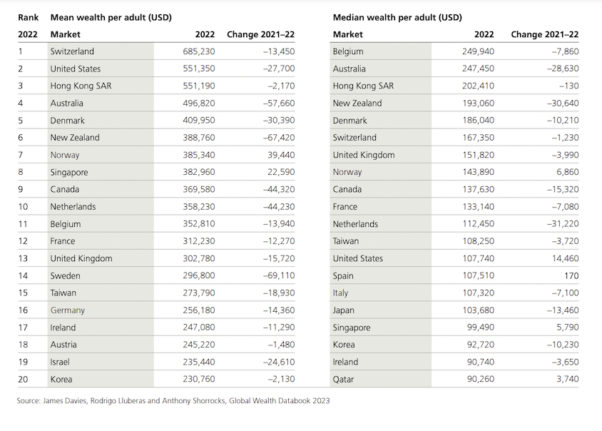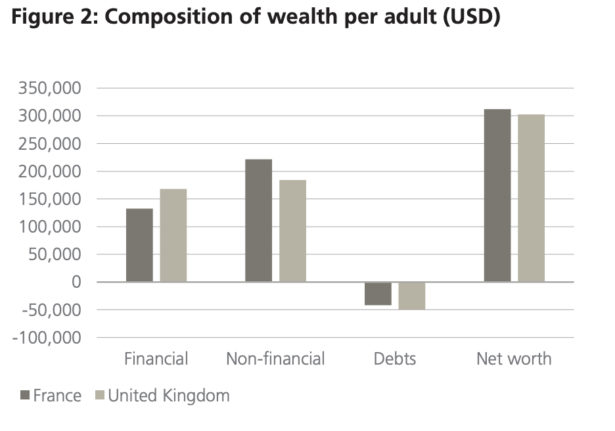France’s global reputation tends to focus on its high personal and business tax rates – but this doesn’t appear to stop French people from becoming rich, as France has now risen to third place in the list of countries with the highest number of millionaires, according to the 2023 Global Wealth Report.
The report found that in 2022 France was home to about 2,821,000 millionaires – 4.8 percent of all the world’s millionaires. It also means that just over four percent of the total French population of 67 million people are millionaires – at least on paper.
France remained well behind the United States, which ranked in first place, with 38.2 percent of the world’s millionaires, and about 10 times (22,710,000) the total millionaires in France – albeit from a population five times as large.
China, home to about 10.5 percent of the global share, beat France for second place, counting 6,231,000 millionaires in 2022 (from a population of 1.4 billion).
Nevertheless, France skirted ahead of Japan, who fell for the first time to fourth place with 4.6 percent of global share of millionaires, followed by Germany with 4.4 percent and the UK with 4.3 percent.
The report also estimates that France would see a 43 percent increase in the number of millionaires by 2027, jumping up to 4,031,000. In contrast, the growth rate for the United States was estimated to be 16 percent.
Understanding wealth in France
The Global Wealth Report arrived at these numbers by looking at both financial assets and non-financial wealth (assets such as property), defining net worth as “financial assets plus real assets (principally housing) owned by households, minus their debts”.
That means that, for example, anyone who owns outright an apartment in Paris that is now valued at more than $1,000,000 would count as a millionaire. Property prices in Paris have risen by 62.5 percent over the past 10 years, and two-bedroom apartments regularly fetch more than a million.
The mean net worth in France in 2022 was valued at $312,230 (€285,000) putting it in 12th place for mean wealth per adult internationally and just ahead of the United Kingdom in 13th place with $302,780 (€267,000 or £236,000).

However, the authors of the report noted that median wealth (which divides the wealth distribution into two equal groups where half the adults have wealth above the median and the other half below the median) is a “more accurate indicator of how the typical person is faring”.
When looking at median wealth per adult, France jumped up to 10th place with $133,140 (€121,000). In comparison, the UK moved up to seventh place, with $151,820 (€138,000) in median wealth per adult.
Meanwhile, countries with higher rates of inequality, like the United States, saw a larger difference between mean wealth and median wealth – going from second place internationally in mean wealth at $551,350 USD to 13th place in median wealth with $107,740 USD.
When it comes to French wealth specifically, there was some similarity with global trends in 2022 – meaning that non-financial assets such as real estate “stayed resilient”, but “financial assets contributed most to wealth declines”.
When compared with the UK, French adults’ wealth is more made up of non-financial assets than financial ones. The country also saw real estate prices increase in 2022, by almost five percent.

French inheritance laws means that many French adults inherit property, especially as state-provided social care means that it’s less common for elderly people to have to sell their homes to pay for care.
Nevertheless, there was still a 3.8 percent decrease in the average net worth per adult in France in 2022, which was mostly explained by a loss of 9.6 percent in financial assets (which can be traded on financial markets).
Non-financial assets increased by 0.3 percent, but not enough to set off the losses in financial assets.
Extreme wealth in France
The report also noted that France made the top 10 for the number of “ultra-high-net-worth” (UHNW) individuals – or those whose wealth rose above $50 million (€45 million). In this area, it ranked in 9th place globally with 3,890 UHNW people.
At the end of 2022 Frenchman Bernard Arnault – head of LVMH luxury good chains – overtook Elon Musk on Forbes billionaires ranking, making him the richest man in the world.
As of August 2023, Arnault was the second wealthiest person on earth as Musk’s fortunes appear to have picked up. The world’s richest woman is also French – Francoise Bettencourt Meyers – who boasts a hefty net worth of $80.5 billion USD (€73 billion) as a businesswoman and heiress to the beauty empire L’Oréal.
The top-100 list for the world’s richest people is noticeably French as well, with names like François Pinault, founder of the luxury goods group Kering, as well as the brothers Alain and Gérard Wertheimer, owners of the Chanel fashion house.
READ MORE: French billionaires top list for world’s richest men and women



 Please whitelist us to continue reading.
Please whitelist us to continue reading.
Member comments